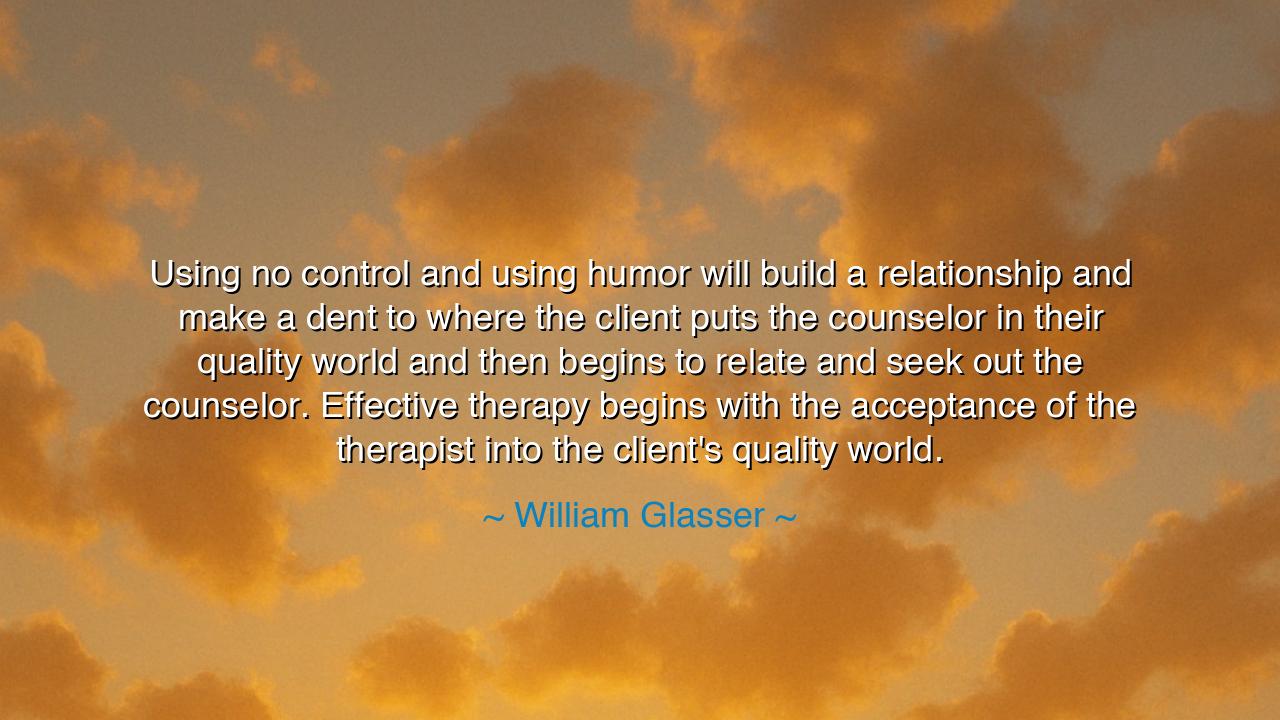
Using no control and using humor will build a relationship and
Using no control and using humor will build a relationship and make a dent to where the client puts the counselor in their quality world and then begins to relate and seek out the counselor. Effective therapy begins with the acceptance of the therapist into the client's quality world.






In the journey of life, we often find ourselves lost in the depths of our own suffering, seeking solace, guidance, and understanding. There are times when the heart cries out for connection, yearning for someone who can listen, comprehend, and offer the comfort of understanding. William Glasser, a sage of the human spirit, speaks to the very heart of this need when he declares, "Using no control and using humor will build a relationship and make a dent to where the client puts the counselor in their quality world and then begins to relate and seek out the counselor. Effective therapy begins with the acceptance of the therapist into the client's quality world." These words speak of a deep and profound truth: that the path to healing is not through force or control, but through the creation of a bond—a bond forged in trust, humor, and the genuine acceptance of another human being.
In a world where power and authority often dominate, it is easy to forget that true connection is not built upon domination, but upon understanding. In the realm of therapy, where the wounded soul comes seeking guidance, the counselor is not a distant figure of authority, but a fellow traveler, a guide who walks alongside the suffering. To truly heal, the counselor must first enter the client's quality world, that inner realm where the client’s most cherished thoughts, fears, and desires reside. This is no small feat, for it requires the therapist to lay down their own judgments, their own control, and meet the client where they are. It is here, in this place of acceptance, that the healing begins.
In ancient times, the great healers and sages understood the power of connection and understanding. The revered Hippocrates, the father of medicine, was not only a man of knowledge but also of deep empathy. His approach to healing was not one of cold analysis, but of a holistic understanding of the patient’s condition—mind, body, and soul. He listened not only with his ears, but with his heart, recognizing that the path to healing was as much about the relationship between healer and patient as it was about the medicine prescribed. Hippocrates knew that to make a dent in the patient's suffering, he must first earn a place in their quality world. Only then could healing truly begin.
And so, we see the wisdom in Glasser's words, as he speaks of using humor as a means of breaking down barriers and building bridges. Humor—that most sacred of human traits—has the power to dissolve the walls we build around ourselves. It allows us to laugh at our flaws, to see our suffering from a new perspective, and to connect with others on a human level. The counselor who uses humor not as a tool of manipulation, but as a way to foster connection, creates a safe space where the client can feel heard, accepted, and understood. In such a space, the client can begin to lower their defenses, to trust, and to invite the counselor into their quality world.
Let us recall the story of the great Rumi, the poet and mystic, whose words still resonate across the centuries. Rumi spoke of love as the greatest force, a force that transcends all boundaries and unites souls. In his teachings, he often emphasized the need to meet others in their suffering, to connect with them at their most vulnerable, and to offer comfort through love and laughter. It is said that Rumi, when confronted with the pain of the world, would often respond with a smile, with a light-heartedness that could not be broken. Through his example, Rumi taught that the path to true healing lies not in control, but in acceptance and the ability to laugh in the face of hardship.
The lesson here is clear. Whether we are counselors, teachers, or simply fellow travelers on this journey of life, we must remember that the foundation of true connection is not built on control, but on acceptance. We must approach others with empathy, with kindness, and with humor, for it is through these qualities that we can earn a place in their quality world. When we strip away the need to dominate or direct, when we allow ourselves to be vulnerable and authentic, we create a space where healing can truly take root.
In our own lives, let us seek to embody these qualities. When we meet others in their suffering, let us not be quick to judge or to impose solutions, but instead, let us listen with open hearts, offering not just advice, but the gift of understanding. Let us use humor to break down the walls that separate us, to invite others into our quality world, and to create bonds that transcend the superficial. And in doing so, we will find that the power to heal, to guide, and to connect lies not in control, but in the simple acts of acceptance and love. This is the path to true healing, the path that Glasser illuminated for us, and it is a path we must walk with open hearts and compassionate spirits.






AAdministratorAdministrator
Welcome, honored guests. Please leave a comment, we will respond soon